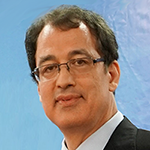According to the International Energy Agency, the building sector is responsible for more than a third of the world’s final energy consumption. Indeed, this sector generates nearly 40% of CO2 emissions. In this context, sustainable energy in buildings must be further improved, especially in an overview at different scale. The different transfer modes must be further detailed as well as the optimization of the envelope and energy production systems from indoor air to the urban microclimate. In addition, in pandemics times, the residential building must be resilient and flexible according to the energy needs of the occupants and also to meet indoor air quality standards.
Team
 |
Overview of Smart and Grid-Interactive Efficient Buildings By Prof. Moncef Krarti Coordinator of Building Systems Program, University of Colorado, USA. |
 |
The future of the built environment in face of Climate Changes and global challenges By Prof. Umberto Berardi Canada Research Chair in Building Science, Ryerson University Toronto, Ontario, Canada. |
 |
Inverse Problem Solutions for the Thermal Characterization of Materials at High Temperatures’ By By Prof. Helcio R. B. Orlande, Escola Politécnica, Federal University of Rio de Janeiro, Brazil. |
 |
Multi-scale Approach CFD Modeling of Airborne Pathogen Droplets of COVID-19 By Dr. Parham Mirzaei Ahranjani, Faculty of Engineering, University of Nottingham, UK. |
Organizing Team
 |
Prof. Mohammed Garoum ENS Director, University Mohammed V in Rabat, Morocco |
 |
Prof. Najma Laaroussi EST, University Mohammed V in Rabat, Morocco |
 |
Dr. Zaid Romani National School of Architecture, Tetouan, Morocco. |
